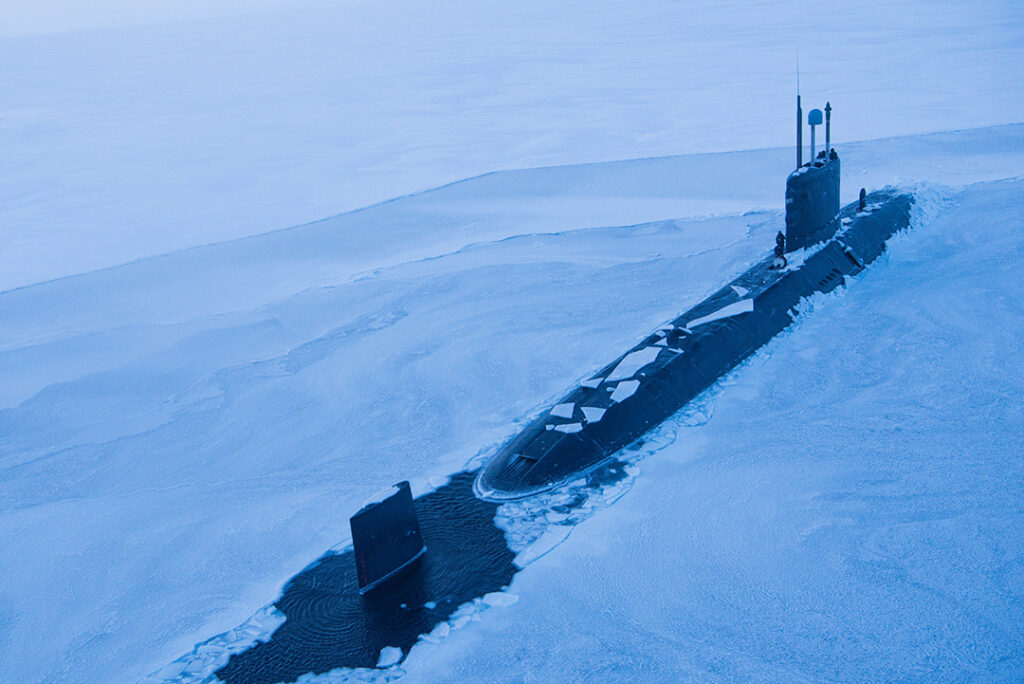THE WATCH STAFF
As strategic competition heats up in the Arctic, the United Kingdom is offering to take part in cold-weather exercises with the Canadian military and to commit its nuclear-powered submarines to the endeavor.
Gen. Sir Nick Carter, the top British military commander, told the Canadian Broadcasting Corp. (CBC) that his country is “keen to cooperate” and learn more about how to survive and fight in the region.
Carter said that Britain would also like to help “Canada do what Canada needs to do as an Arctic country,” according to a September 24, 2021, CBC News story.
Canada has historically been reluctant to allow even close allies to become deeply embedded in the Arctic, mostly because of contested claims to Canada’s sovereignty in the region, according to CBC News.
“Concern over Canada’s exclusion from the recent security pact between the United States, the United Kingdom and Australia [AUKUS] may lend fresh urgency to the U.K.’s proposal, however,” CBC News said.
The CBC interview was conducted before the AUKUS pact was announced.
Carter’s remarks came in the wake of Russia’s decision to reactivate Cold War bases in the Arctic, as well as Chinese ambitions to work with Moscow in establishing a global transport corridor via the Northern Sea Route, according to a September 26 story in London’s Daily Express newspaper.
Those developments figured prominently in discussions at a summit of NATO leaders in June 2021, according to CBC News.
“NATO is having to assess how it will address the emerging China-Russia alignment, which is at its strongest in the Arctic,” maritime expert Alessio Patalino, of King’s College London, told the Daily Express. “Britain has niche capabilities which it can offer.”
Carter said those capabilities could help to monitor the Arctic’s rapidly melting seas and inlets, but it would be up to the Canadian government to decide.
“We would absolutely defer to Canada’s expertise in this,” he told CBC News. “I think we have military capabilities, certainly in the maritime domain and in terms of our science, that would be useful to Canada.”
What Britain has — and Canada lacks — is a fleet of nuclear-powered submarines, which can operate under ice for extended periods.
The British rejoined the biennial American-led Ice Exercise (ICEX) in 2018 with their nuclear-powered subs. (Pictured: The Royal Navy’s HMS Trenchant surfaces in the Arctic Circle in support of ICEX.) In March 2021, Russia raised concerns when it sent three ultra-quiet nuclear subs to simultaneously punch through the ice in the same location, according to CBC News.
“We do not have the capability of engaging Russian submarines or Chinese submarines, if and when that ever becomes a reality,” the University of Calgary’s Rob Huebert, speaking about the Canadian Navy, told CBC News.
Defence Minister Harjit Sajjan’s office said in a statement to CBC News that the Arctic is a zone of global cooperation that requires “continued collaboration and partnership with our close allies, including the United Kingdom.”
Patalino told the Express: “Whether Canada takes up the offer or not, it’s important to see that, during the AUKUS negotiations, this opening was given to Ottawa. We are thinking comprehensively and not leaving allies behind.”
IMAGE CREDIT: PETTY OFFICER 2ND CLASS MICHAEL H. LEE/U.S. NAVY

